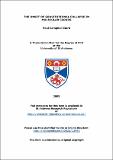Files in this item
The onset of gravitational collapse in molecular clouds
Item metadata
| dc.contributor.advisor | Bonnell, Ian Alexander | |
| dc.contributor.author | Clark, Paul Campbell | |
| dc.coverage.spatial | xii, 112 p. | en_US |
| dc.date.accessioned | 2018-03-14T16:30:16Z | |
| dc.date.available | 2018-03-14T16:30:16Z | |
| dc.date.issued | 2005 | |
| dc.identifier.uri | https://hdl.handle.net/10023/12945 | |
| dc.description.abstract | We conduct an investigation into the role that turbulence plays in the formation of stars. In small clouds, with masses of ~ 30 Mʘ and where the turbulence is only injected at the start, we find that the turbulence does not trigger star formation. Instead, the dissipation of the kinetic energy allows the mean Jeans mass of the cloud to control the formation of stars. The equipartition of the kinetic and thermal energies in the final stages before star formation, allows the pre-protostellar clumps to fragment. Binary and multiple systems are thus a natural product of star formation in a turbulent environment. We find that globally unbound clouds can be the sites of star formation. Furthermore the star formation efficiency is naturally less than 100%, thus in part providing an explanation for the low efficiency in star forming regions. Globally unbound GMCs not only form stars, and naturally disperse, within a few crossing times, but also provide a mechanism for the formation of OB associations. | en_US |
| dc.language.iso | en | en_US |
| dc.publisher | University of St Andrews | |
| dc.subject.lcc | QB806.C6 | |
| dc.subject.lcsh | Stars--Formation. | en |
| dc.subject.lcsh | Molecular clouds--Mathematical models. | en |
| dc.subject.lcsh | Turbulence. | en |
| dc.subject.lcsh | Hydrodynamics. | en |
| dc.title | The onset of gravitational collapse in molecular clouds | en_US |
| dc.type | Thesis | en_US |
| dc.accrualMethod | en | |
| dc.type.qualificationlevel | Doctoral | en_US |
| dc.type.qualificationname | PhD Doctor of Philosophy | en_US |
| dc.publisher.institution | The University of St Andrews | en_US |
This item appears in the following Collection(s)
Items in the St Andrews Research Repository are protected by copyright, with all rights reserved, unless otherwise indicated.

